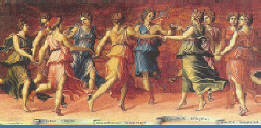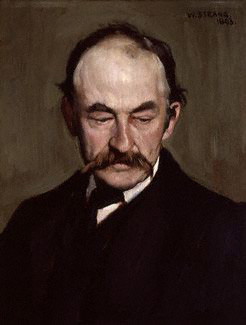|
|
Hardy was born in Lower Bockhampton, Dorset, to a family of modest means but he was
encouraged in academic studies by his mother and the local schoolmaster. He left school
at 16 to study architecture in Dorchester moving in 1862 to London for further study;
but he returned to Dorset to resume local practice and to begin writing.
In 1870, whilst advising on church architecture, he met his future wife, Emma Gifford,
who, in the finely graded society of the time, considered herself his social superior,
which led to later marital difficulties despite his increasing fame. His third published
novel, A Pair of Blue Eyes, drew on his courtship of her.
He achieved lasting fame with "Far from The Madding Crowd", a quotation from Gray's Elegy,
and devoted his life to writing. He is widely recognized as a great novelist with several
well-received publications mostly associated with the Wessex area, named after the
kingdom of that name in the Saxon era. They deal with rural themes and the dignity
of the lower classes. They blend poverty with riches, disadvantage with privilege,
aspirations with class rigidity. His tendency for realism attracted opprobrium,
however, until, after Jude The Obscure, published in 1895, he gave up writing
novels and turned exclusively to poetry, which had already occupied him for
several decades, publishing Wessex Poems in 1898.
After the death of Emma, in 1912, he married his secretary, the much younger Florence
Dugdale, who encouraged his publications and produced a biography after his death from
Pleurisy in 1928. His poetic output was considered of lower quality than his novels
but recent decades have re-evaluated him as one of the most important poets of the
time. His themes often address remorse, sadness, lamentation and bewilderment of
which The Darkling Thrush is the most representative.
|

